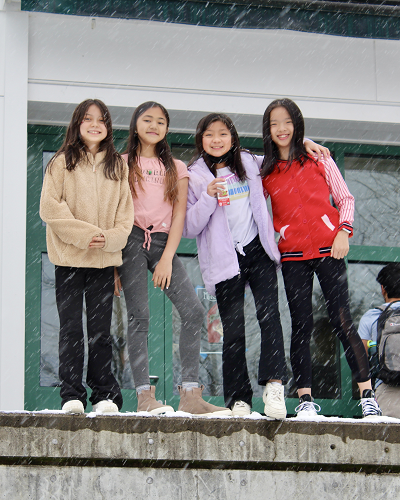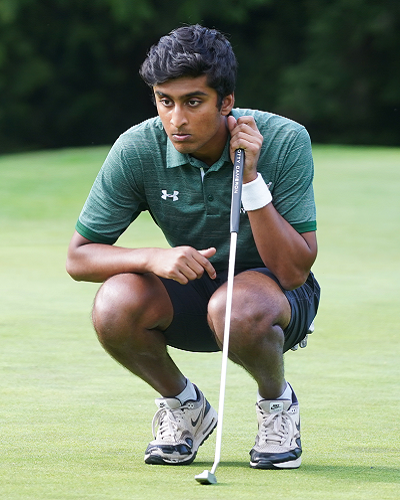Exploring Oneself Through a 30-Day Challenge
When Social Studies Department Chair, Sara Baquero-Garcia, joined Overlake a few years ago she brought with her an idea to grow a civics class that imbedded experiential learning. What she came up with was the 30-Day Project. “That 30-day idea of tackling something and living it can really be quite powerful,” says Baquero-Garcia.
Baquero-Garcia had seen the 2004 documentary Super Size Me in which Morgan Spurlock took on the McDonald’s fast-food chain by immersing himself on a diet of only McDonald’s food for 30 days. She found the premise powerful and wanted to translate it to the classroom. “As a teacher I don’t see myself as a purveyor of knowledge, I see myself as a coach in the sense of a guide.”
So, she set up the 30-Day Project in which all eighth-grade students at Overlake embark on as a sort of capstone project. “Kids can come up with whatever they want to do and I’m not going to say no to it,” explains Baquero-Garcia. “Certainly, with Middle School kids, they have a lot of limitations. No parent wants their child to sleep under a bridge. So, I always tell the kids when I introduce this project ‘I’m not the one to stop you from your goals, but you need to sell it to your parents. You need to have their support.’”
And so, each student comes up with a 30-day challenge that is as unique as they are. This year we have students who are bicycling to school, gathering drinking water from a nearby stream, sleeping outdoors in a tent, and everything in-between.
Kevin McKenna, a new faculty member in the Social Studies department, has also been involved in this project. “I’ve been pretty impressed with how mature this group of 13 and 14-year-olds is. It’s been a pretty amazing group to work with this year.”
McKenna, who may be new to Overlake, is not new to the idea of teaching activism in the classroom. He says this project provides the perfect platform for self-exploration. “I hope, and I think the students are beginning to think about, the privilege they do have and the responsibility that comes with that. So, thinking about how to engage with the world in a meaningful and also an ethical way to make this world a better place.”
The students might be tempted to outdo their classmates, but Baquero-Garcia warns them that in the end whatever project they chose will be personal to them and unique as they are. “It’s not about what the project will show the community it is what you’re getting from it. That personal trial, personal learning, personal awareness and then to share that with community.”
Each student is required to log their experiences in a journal that is put online for the class and community to see. You can click on the link here to see what the students have been up to. Keep in mind the project runs until this weekend, so some of these websites may still be a work in progress.
 Lucy S. is independent. Her 30-Day Project relied on her putting trust in others to help. For ten-day periods, she did her best to experience life as a blind, deaf, and mute person. The only time she didn't experience her project was during class time, so she was able to continue to keep up with her school work. But during non-classroom times, Lucy wore special glasses which blocked her vision for the blindness portion of the project. “Blindness was the most challenging,” says Lucy. “Friends would ask, ‘Can you see how many fingers I’m holding up?’ testing me to see if I was being true to the project. I also had to depend on other people to help me around campus.” Noise-cancelling headphones were used for the hearing-impaired portion of the project where, true to her assignment, my interview questions were loud, clear, and sometimes repeated. For the mute portion of her project, Lucy didn’t speak at all except for her classes. “I find myself observing things around me a lot better,” says Lucy. “It’s given me an appreciation for all that I have, and the people who adapt to life’s challenges.” Thankfully, her role as James in the 7th/8th grade production of James and the Giant Peach is a school project that hasn’t impacted her rehearsals!
Lucy S. is independent. Her 30-Day Project relied on her putting trust in others to help. For ten-day periods, she did her best to experience life as a blind, deaf, and mute person. The only time she didn't experience her project was during class time, so she was able to continue to keep up with her school work. But during non-classroom times, Lucy wore special glasses which blocked her vision for the blindness portion of the project. “Blindness was the most challenging,” says Lucy. “Friends would ask, ‘Can you see how many fingers I’m holding up?’ testing me to see if I was being true to the project. I also had to depend on other people to help me around campus.” Noise-cancelling headphones were used for the hearing-impaired portion of the project where, true to her assignment, my interview questions were loud, clear, and sometimes repeated. For the mute portion of her project, Lucy didn’t speak at all except for her classes. “I find myself observing things around me a lot better,” says Lucy. “It’s given me an appreciation for all that I have, and the people who adapt to life’s challenges.” Thankfully, her role as James in the 7th/8th grade production of James and the Giant Peach is a school project that hasn’t impacted her rehearsals!
 Just as astronauts and mission control specialists deal with emergencies, Declan V. is discovering that planning for the unexpected is crucial to success. For thirty days, he only ate MRE (Meals Ready to Eat) which astronauts consume while in space. “The foods are really filling, and I don’t feel deprived,” says Declan. “The beef stew is really delicious, but some don’t taste very good.” Declan has unexpectedly discovered that some foods taste better than others. In fact, he’s running out of food, and now is pulling MRE leftovers to ration over the final days of his project. He’s avoided the peer pressure to eat other foods, and the only day off from his project was his birthday so he could enjoy some cake. At the lunch table, he gets lots of looks from classmates and teachers as he prepares meals from specially ordered containers and a food heater that uses a chemical reaction to warm up his MRE. “I’ve been recording my weight, and I’ve lost eight pounds. I’d do some things differently, but I’d do it again,” explains Declan. Who knows? He may be our first Overlake astronaut.
Just as astronauts and mission control specialists deal with emergencies, Declan V. is discovering that planning for the unexpected is crucial to success. For thirty days, he only ate MRE (Meals Ready to Eat) which astronauts consume while in space. “The foods are really filling, and I don’t feel deprived,” says Declan. “The beef stew is really delicious, but some don’t taste very good.” Declan has unexpectedly discovered that some foods taste better than others. In fact, he’s running out of food, and now is pulling MRE leftovers to ration over the final days of his project. He’s avoided the peer pressure to eat other foods, and the only day off from his project was his birthday so he could enjoy some cake. At the lunch table, he gets lots of looks from classmates and teachers as he prepares meals from specially ordered containers and a food heater that uses a chemical reaction to warm up his MRE. “I’ve been recording my weight, and I’ve lost eight pounds. I’d do some things differently, but I’d do it again,” explains Declan. Who knows? He may be our first Overlake astronaut.
.jpg) During World War II, the Nazi regime forced Jews to wear armbands with the Star of David to discriminate against the religious population. That label was what Annie H. decided to wear for her 30-day project to show how discrimination and labels impact lives. “I’m Jewish, and when I talked with my parents about what I could do, we came up with the idea that I would wear the Star to not only honor my family but also bring attention to today’s discussion about refugees and immigrants,” says Annie. She made a lanyard with the Star of David with the word “Jude” on it. Annie says she’s had to explain to people who aren’t aware of her project why she wears it. That is a small part of an activism component of her project. “I’ve had the opportunity to meet refugees who have escaped hate only to find discrimination here. That labeling of people causes so much hurt,” says Annie. While her 30-day project is ending, she says it’s just the start of her activism to help America’s newest residents.
During World War II, the Nazi regime forced Jews to wear armbands with the Star of David to discriminate against the religious population. That label was what Annie H. decided to wear for her 30-day project to show how discrimination and labels impact lives. “I’m Jewish, and when I talked with my parents about what I could do, we came up with the idea that I would wear the Star to not only honor my family but also bring attention to today’s discussion about refugees and immigrants,” says Annie. She made a lanyard with the Star of David with the word “Jude” on it. Annie says she’s had to explain to people who aren’t aware of her project why she wears it. That is a small part of an activism component of her project. “I’ve had the opportunity to meet refugees who have escaped hate only to find discrimination here. That labeling of people causes so much hurt,” says Annie. While her 30-day project is ending, she says it’s just the start of her activism to help America’s newest residents.


